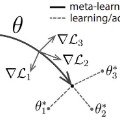Recent work has shown that language models (LMs) trained with multi-task \textit{instructional learning} (MTIL) can solve diverse NLP tasks in zero- and few-shot settings with improved performance compared to prompt tuning. MTIL illustrates that LMs can extract and use information about the task from instructions beyond the surface patterns of the inputs and outputs. This suggests that meta-learning may further enhance the utilization of instructions for effective task transfer. In this paper we investigate whether meta-learning applied to MTIL can further improve generalization to unseen tasks in a zero-shot setting. Specifically, we propose to adapt meta-learning to MTIL in three directions: 1) Model Agnostic Meta Learning (MAML), 2) Hyper-Network (HNet) based adaptation to generate task specific parameters conditioned on instructions, and 3) an approach combining HNet and MAML. Through extensive experiments on the large scale Natural Instructions V2 dataset, we show that our proposed approaches significantly improve over strong baselines in zero-shot settings. In particular, meta-learning improves the effectiveness of instructions and is most impactful when the test tasks are strictly zero-shot (i.e. no similar tasks in the training set) and are "hard" for LMs, illustrating the potential of meta-learning for MTIL for out-of-distribution tasks.
翻译:近期工作表明,经过多任务 \ textit{ instruction learning} (MTIL) 培训的语言模式(LMS) 可以在零和少发环境中解决不同的NLP任务,与快速调和相比,业绩有所改善。 MTIL 显示,LMS能够从投入和产出的表面模式之外的指示中提取和使用有关任务的信息。这意味着元学习可以进一步加强对指示的有效任务转移的利用。在本文中,我们调查适用于MTIL的元学习能否在零发环境中进一步改进对无形任务的概括化。具体地说,我们建议将元学习改成MTIL的三个方向:1) 示范Agnoti Metem Learning (MAML),2) 超超网络(HNet) 以适应为基础,产生以指示和产出表面模式外的特定任务参数。3) 将HNet和MAML相结合的方法。通过大规模自然指令V2数据集的广泛实验,我们表明,我们提出的方法在零发环境中大大改进强的基线。特别是,元学习提高了指令的效力,当测试任务“测试任务的潜在任务是“MTIL-S-shi-shi-training ” 时,在测试任务中是完全的零化任务中不具有最大影响。




